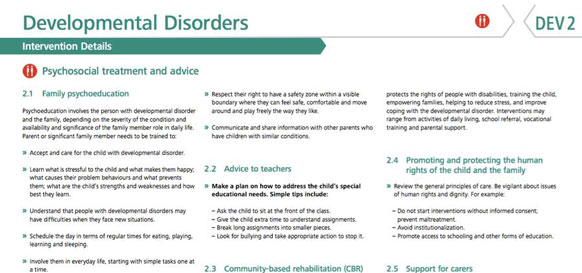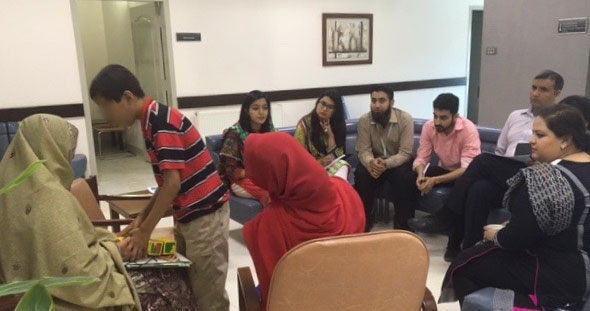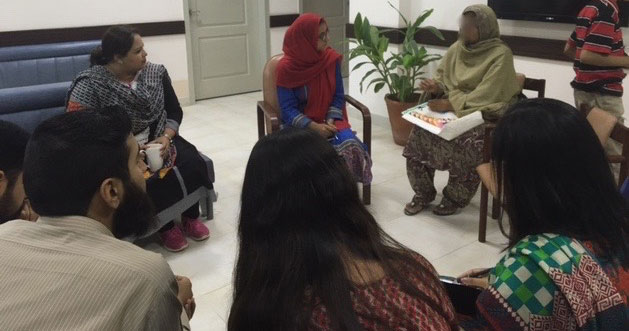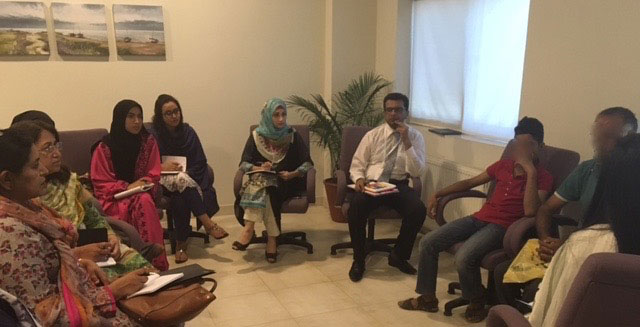Saturday, 23rd April 2016
Overview:
Nearly 50% of Pakistan’s population is under the age of 19 years. Mental disorders are extremely common in children & young adults. A sizable proportion of these disorders are preventable and treatable. Unfortunately, 75% of people suffering from these disorders in countries like Pakistan do not have access to the treatment, thereby resulting in a huge treatment gap. The WHO has launched a Mental Health Gap Action Programme (mhGAP) to help scale up services for mental disorders especially in primary care setting. Developmental disorders have been recognized as a priority disorder . As part of mhGAP, experts from all over the world, based on current evidence, have developed a training module on Developmental disorders.
This workshop is designed according to the mhGAP training guidelines, to help non-specialist healthcare staff to recognize and help children with developmental disabilities. It focuses on enhancing the skills to assess children & young people with disabilities, support & counsel their families and refer them appropriately. This is achieved through a hands-on experience of interviewing real patients and role-plays. The participants will work together to formulate assessments and outline management plans including psychosocial interventions.
The discussions are based on step-by-step flow charts, which helps assess these disorders and make clinical decisions accordingly. There is ample opportunity to interact with senior mental health professionals to clarify existing dilemma in their clinical practices.
These training guidelines have already been implemented in Bannu District in 2015, where around 60 primary care physicians were trained in collaboration with International Medical Corps.
Nearly 50% of Pakistan’s population is under the age of 19 years. Mental disorders are extremely common in children & young adults. A sizable proportion of these disorders are preventable and treatable. Unfortunately, 75% of people suffering from these disorders in countries like Pakistan do not have access to the treatment, thereby resulting in a huge treatment gap. The WHO has launched a Mental Health Gap Action Programme (mhGAP) to help scale up services for mental disorders especially in primary care setting. Developmental disorders have been recognized as a priority disorder . As part of mhGAP, experts from all over the world, based on current evidence, have developed a training module on Developmental disorders.
This workshop is designed according to the mhGAP training guidelines, to help non-specialist healthcare staff to recognize and help children with developmental disabilities. It focuses on enhancing the skills to assess children & young people with disabilities, support & counsel their families and refer them appropriately. This is achieved through a hands-on experience of interviewing real patients and role-plays. The participants will work together to formulate assessments and outline management plans including psychosocial interventions.
The discussions are based on step-by-step flow charts, which helps assess these disorders and make clinical decisions accordingly. There is ample opportunity to interact with senior mental health professionals to clarify existing dilemma in their clinical practices.
These training guidelines have already been implemented in Bannu District in 2015, where around 60 primary care physicians were trained in collaboration with International Medical Corps.
Learning Outcomes
At the completion of the workshop, participants will be able to:
1. Apply a general framework for working with children & adolescents.
2. Assess for developmental delay .
3. Provide family psychoeducation.
4. Investigate and manage main risk factors for developmental delay.
5. Assess carers' needs and provide support.
6. Collaborate with other agencies: Specialists, Education, Social and Rehabilitation services.
Target Audience
Mental Health Care for Children with Disability would be particularly useful for the following:
• Healthcare staff working with children
• Mental healthcare staff
• Staff of humanitarian agencies and social services
• Postgraduate & undergraduate medical students
• Healthcare staff working with children
• Mental healthcare staff
• Staff of humanitarian agencies and social services
• Postgraduate & undergraduate medical students
Facilitator
1. Dr Asma Humayun is a member of the Royal College of Psychiatrists and has over 20 years of academic and clinical experience. This also includes complex psychiatric interventions, capacity building for mental health resource, medical education & service development. She has been an undergraduate and postgraduate trainer at Rawalpindi Medical College for 18 years. She is the author of a textbook of Behavioural Sciences, which has been approved by the Higher Education Commission for undergraduate and postgraduate medical training in the country. She also has extensive experience of working as a consultant for the WHO as a psychosocial advisor. She is part of the WHO working group for revising mhGAP training package over the last two years. In addition, she is also a member of the WHO working groups for revising stress-related disorders for ICD 11. She has a special interest in integrating mental health into primary care and establishing trauma focused services. More recently, she led a Mental Health & Psycho-social initiative for the IDPs in Bannu District. On behalf of International Medical Corps, she was the consultant and master trainer for the training primary care physicians in Bannu district.
Feedback
| Above Average (%) | Average (%) | Below Average (%) | |
|---|---|---|---|
| Overall Experience | 88 | 12 | 0 |
| Content | 62 | 38 | 0 |
| Methodology | 88 | 12 | 0 |
| Interactive | 100 | 0 | 0 |
| Facilitators | 88 | 12 | 0 |
| Audio-visual aids | 38 | 62 | 0 |
| Exercises | 94 | 6 | 0 |
| Handouts | 50 | 38 | 12 |
| Relevance to your work | 82 | 12 | 6 |
| Logistics | 88 | 12 | 0 |
• We need a workshop on Autism.
• Working with real patients and their families (hands on training) was an excellent experience.
• An advanced workshop on treatment of depression should be arranged.
• Management guidelines should be discussed in more details as this is such a common problem. • More doctors should attend these workshops.






